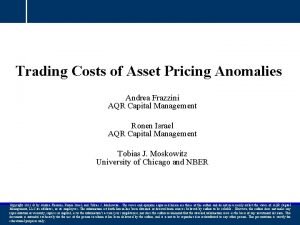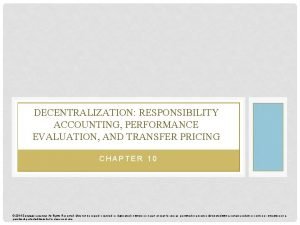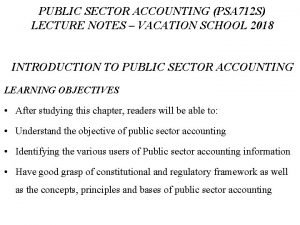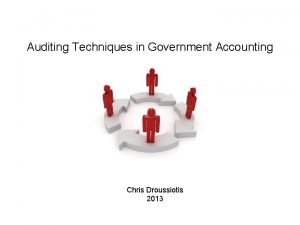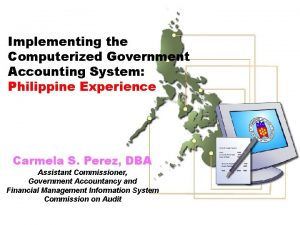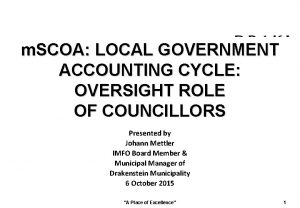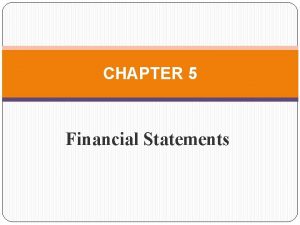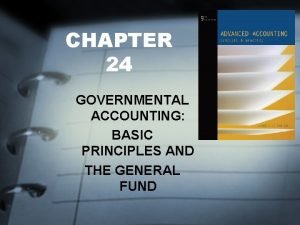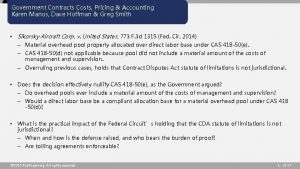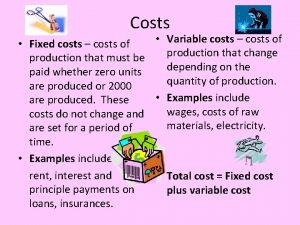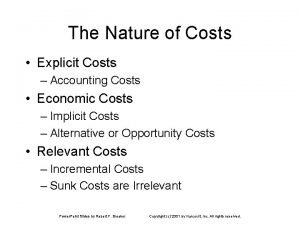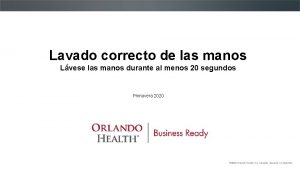Government Contracts Costs Pricing Accounting Karen Manos Dave











- Slides: 11

Government Contracts Costs, Pricing & Accounting Karen Manos, Dave Hoffman & Greg Smith • Sikorsky Aircraft Corp. v. United States , 773 F. 3 d 1315 (Fed. Cir. 2014) – Material overhead pool properly allocated over direct labor base under CAS 418 -50(e). – CAS 418 -50(d) not applicable because pool did not include a material amount of the costs of management and supervision. – Overruling previous cases, holds that Contract Disputes Act statute of limitations is not jurisdictional. • Does the decision effectively nullify CAS 418 -50(e), as the Government argued? – Do overhead pools ever include a material amount of the costs of management and supervision? – Would a direct labor base be a compliant allocation base for a material overhead pool under CAS 418 -50(d)? • What is the practical impact of the Federal Circuit’s holding that the CDA statute of limitations is not jurisdictional? – When and how is the defense raised, and who bears the burden of proof? – Are tolling agreements enforceable? © 2015 Pub. KLearning. All rights reserved. 1 of XX

Government Contracts Costs, Pricing & Accounting Karen Manos, Dave Hoffman & Greg Smith • Sikorsky Aircraft Corp. v. United States, 2015 WL 4970553 (Fed. Cl. Aug. 20, 2015) – Government’s “alternative claim” for increased costs resulting from “voluntary” accounting change barred by claim preclusion. • What was wrong with the Government’s “alternative claim”? – What are the elements of claim preclusion? – Does FAR subpart 30. 6 permit the cognizant Federal agency official to issue a final decision asserting alternative claims for both a Cost Accounting Standard noncompliance and a unilateral change in accounting practice? © 2015 Pub. KLearning. All rights reserved. 2 of XX

Government Contracts Costs, Pricing & Accounting Karen Manos, Dave Hoffman & Greg Smith • K-Con Building Sys. , Inc. v. United States, 778 F. 3 d 1000 (Fed. Cir. 2015) – Once a claim is in litigation at the Court of Federal Claims, the Contracting Officer may not rule on it, even if the claim is not properly in litigation because it was not properly submitted to and denied by CO. – But, contractor may submit “separate” claim while related claim is pending before the COFC. – Complaint determines what is in litigation; claim determines extent of COFC jurisdiction. – Claims are separate “if they either request different remedies (whether monetary or nonmonetary) or assert grounds that are materially different from each other factually or legally. ” • What is the practical impact of the Federal Circuit’s decision? – Does it change the definition of the “same” claim? – Does it create a potential jurisdictional trap? © 2015 Pub. KLearning. All rights reserved. 3 of XX

Government Contracts Costs, Pricing & Accounting Karen Manos, Dave Hoffman & Greg Smith • Raytheon Co. , ASBCA Nos. 57576 et al. , 2015 WL 4604897 (A. S. B. C. A. Jun. 26, 2015) – Rejects Government’s overbroad interpretation of “expressly unallowable” and holds that expressly unallowable costs are those specifically named and stated to be unallowable. – In addition, to assess penalties, Government must show that it was unreasonable under all the circumstances for the contractor to believe the costs are allowable. – Cost of bonuses and incentive compensation for employees participating in expressly unallowable activities is not expressly unallowable under FAR 31. 205 -1, -22 and -27, but is expressly unallowable under FAR 31. 205 -47. – Total shareholder return component of long term incentive compensation is expressly unallowable under FAR 31. 205 -6(i)(1). • How does the Board’s decision compare to DCAA’s recent audit guidance on expressly unallowable costs? – “Thus, a cost principle makes costs expressly unallowable if: 1. It states in direct terms that the costs are unallowable, or leaves little room for differences of opinion as to whether the particular cost meets the allowability criteria; and 2. It identifies the specific cost or type of costs in a way that leaves little room for interpretation. ” © 2015 Pub. KLearning. All rights reserved. 4 of XX

Government Contracts Costs, Pricing & Accounting Karen Manos, Dave Hoffman & Greg Smith • Raytheon Co. , Space & Airborne Sys. , ASBCA Nos. 57801 et al. , 2015 WL 4134791 (A. S. B. C. A. May 7, 2015) – FAR 30. 606 validly precludes offsetting multiple, simultaneous accounting practice changes for contracts awarded on or after April 8, 2005. – When change shifts costs from fixed price to cost reimbursement contracts, Government cannot “double count” impact. – ACO has discretion to determine desirability of changes. – Compound interest applies to increased costs of voluntary accounting changes. • Is the Board’s decision correct? © 2015 Pub. KLearning. All rights reserved. 5 of XX

Government Contracts Costs, Pricing & Accounting Karen Manos, Dave Hoffman & Greg Smith • Kellogg Brown & Root Servs. , Inc. v. United States, 2015 WL 1966532 (D. Del. Apr. 30, 2015) – Case against DCAA for damages caused by negligent audit barred by discretionary function exception in the Federal Tort Claims Act – Holds that both the DCAA audit and subsequent Department of Justice False Claims Act action were discretionary functions. • Is the court’s decision correct? © 2015 Pub. KLearning. All rights reserved. 6 of XX

Government Contracts Costs, Pricing & Accounting Karen Manos, Dave Hoffman & Greg Smith • Final Rule on Uncompensated Overtime, 80 Fed. Reg. 4992 (Jan. 29, 2015) – Published without public comment, ostensibly “because it only clarifies policy that is already stated in the FAR. ” – Revised FAR 37. 115 -2 and paragraph (b) of FAR 52. 237 -10, IDENTIFICATION OF UNCOMPENSATED OVERTIME, to require contractors to apply the adjusted hourly rate (including uncompensated overtime), rather than hourly rate to all proposed hours, whether regular or overtime, “whenever there is uncompensated overtime. ” – Left unchanged FAR 52. 237 -10(c) requirement that an offeror’s accounting practices used to estimate uncompensated overtime must be consistent with the cost accounting practices used to accumulate and report uncompensated overtime hours. – The revised FAR 52. 237 -10(b)(2) states that this requirement applies to all proposals, whether the labor hours are at the prime or subcontract level, and applies to uncompensated overtime hours that are in indirect cost pools for personnel whose regular hours are normally charged as direct costs. • Does the revised FAR 52. 237 -10 mean what it appears to say? © 2015 Pub. KLearning. All rights reserved. 7 of XX

Government Contracts Costs, Pricing, & Accounting Mary Karen Wills • OMB Uniform Administrative Requirements, Cost Principles, and Audit Requirements for Federal Awards (2 CFR 200) – – • Final Rule effective December 26, 2014 Applicable to non-Federal entities including: Hospitals, Institutions of Higher Education, Non-Profit organizations, State and Local government, and Indian Tribal Governments that receive Federal assistance awards as a recipient or subrecipient, and their auditors. Regulatory Harmonization – – – General, Pre-Award, Post-Award • A-89 - Federal Domestic Assistance Program Information • A-102 - Awards and Cooperative Agreements with State and Local Governments • A-110 - Uniform Administrative Requirements for Awards and Other Agreements with Institutions of Higher Education, Hospitals and Other Nonprofit Organizations Cost Principles • A-21 - Cost Principles for Higher Education Institutions • A-87 - Cost Principles for State, Local, and Indian Tribal Governments • A-122 - Cost Principles for Non-Profit Organizations Audit • A-50 - Audit Follow Up • A-133 - Audits of States, Local Governments and Non-Profit Organizations © 2015 Pub. KLearning. All rights reserved. 8 of XX

Government Contracts Costs, Pricing, & Accounting Mary Karen Wills • Critical New Areas- where requirements differ from existing regulatory guidance, should be a primary area of focus as organizations implement new regulations – Internal Controls – Certifications for financial reports, vouchers requesting payment and incurred indirect cost claims – Mandatory Disclosure Requirements – Time and Effort Reporting – Performance Measurement and Financial Management – NICRA/Indirect Rate Process Options © 2015 Pub. KLearning. All rights reserved. 9 of XX

Government Contracts Costs, Pricing, & Accounting Mary Karen Wills • Audit – Increases to thresholds for Single Audit and for reportable questioned costs – 2015 A-133 Compliance Supplement released June 2015 • Selected Areas of Interest- updated guidance, should be areas of emphasis as organizations implement new regulations – Subrecipient definition- clarity provided for subrecipient, vendor, contractor determination – Fixed Amount Awards – Subrecipient Administration and Monitoring – Cost Sharing – Procurement and Property Standards © 2015 Pub. KLearning. All rights reserved. 10 of XX

Government Contracts Costs, Pricing, & Accounting Mary Karen Wills • Next steps – Review Organizational and Personal Conflict of Interest Policies – Internal Controls – Certifications – Mandatory Disclosures – Accounting practice, system and reporting changes – Time and Effort Reporting – Subrecipient Administration and Monitoring © 2015 Pub. KLearning. All rights reserved. 11 of XX
 Karen manos
Karen manos Andrea frazzini
Andrea frazzini Types of responsibility accounting
Types of responsibility accounting State and federal constitutions
State and federal constitutions Public sector accounting lecture notes in kenya
Public sector accounting lecture notes in kenya Overview of government accounting
Overview of government accounting Computerized accounting system in the philippines
Computerized accounting system in the philippines Government accounting cycle
Government accounting cycle What are the 5 types of financial statements?
What are the 5 types of financial statements? Government accounting basics
Government accounting basics Government accounting 101
Government accounting 101 Do water contracts gets smaller when it freezes
Do water contracts gets smaller when it freezes

